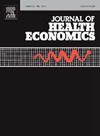电子烟口味禁令对烟草使用的影响
IF 3.6
2区 经济学
Q1 ECONOMICS
引用次数: 0
摘要
支持限制加味电子烟销售的人士认为,加味电子烟对年轻人很有吸引力,会导致他们对尼古丁上瘾。利用来自各种调查(青少年风险行为调查、行为风险因素监测调查和烟草与健康人口评估)的数据,本研究是第一个研究州和地方限制销售调味电子尼古丁输送系统(ENDS)产品对青少年和年轻人烟草使用的影响的研究之一。我们发现强有力的证据表明,采用ENDS口味限制可以减少青少年短期频繁和日常使用ENDS的大约2 - 3个百分点。一些证据表明,这种影响在两年后减弱。我们还记录了18-30岁年轻人使用ENDS的减少,两年后似乎会加强。最后,有证据表明,在某些年龄组中,有香味的电子烟会被无香味的电子烟和香烟取代。本文章由计算机程序翻译,如有差异,请以英文原文为准。
The effect of e-cigarette flavor bans on tobacco use
Advocates for sales restrictions on flavored e-cigarettes argue that flavors appeal to young people and lead them down a path to nicotine addiction. Using data from a variety of surveys (Youth Risk Behavior Surveys, Behavioral Risk Factor Surveillance Survey, and Population Assessment of Tobacco and Health), this study is among the first to examine the effect of state and local restrictions on the sale of flavored electronic nicotine delivery system (ENDS) products on youth and young adult tobacco use. We find robust evidence that the adoption of an ENDS flavor restriction reduces short-run frequent and everyday ENDS use among youths by approximately two-to-three percentage-points. Some evidence suggests that this effect weakens after two years. We also document reductions in ENDS use among young adults aged 18-30 that appear to strengthen after two years. Finally, evidence suggests substitution from flavored ENDS to unflavored ENDS and cigarettes among certain age groups.
求助全文
通过发布文献求助,成功后即可免费获取论文全文。
去求助
来源期刊

Journal of Health Economics
医学-卫生保健
CiteScore
6.10
自引率
2.90%
发文量
96
审稿时长
49 days
期刊介绍:
This journal seeks articles related to the economics of health and medical care. Its scope will include the following topics:
Production and supply of health services;
Demand and utilization of health services;
Financing of health services;
Determinants of health, including investments in health and risky health behaviors;
Economic consequences of ill-health;
Behavioral models of demanders, suppliers and other health care agencies;
Evaluation of policy interventions that yield economic insights;
Efficiency and distributional aspects of health policy;
and such other topics as the Editors may deem appropriate.
 求助内容:
求助内容: 应助结果提醒方式:
应助结果提醒方式:


